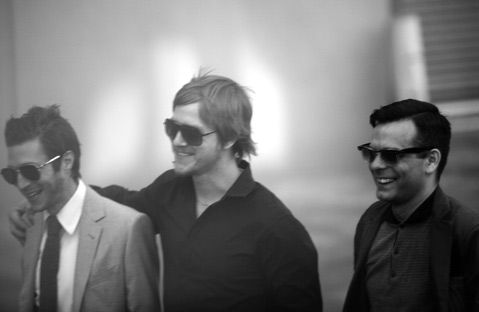Interpol Doesn’t Want Your Fashion Tips
Sam Fogarino Talks Critics, Major Label Woes, and Moving Forward

From the opening bars of Interpol’s latest, self-titled album, there’s no question who’s behind the mikes. Like the three records that came before it, Interpol is drenched with post-punk guitar progressions, thumping percussion, and frontman Paul Banks’s ever-affected baritone. But a closer listen reveals a different, more self-aware outfit than we’ve come to know. For opening track “Success,” Banks laments, “Seas of long life / What safety can you find?” before breaking into a self-loathing, chorus-starting chant: “I have succeeded.”
“I think we’re all a lot more relaxed in terms of what exactly is happening and accepting of the fact that we could be hitting a certain level of establishment,” says drummer Sam Fogarino of Interpol today. “It’s a hard transition to make because before you hit a level of establishment, there’s backlash. You go from being kind of darlings and on everybody’s cool list to not being so cool and not delivering what you did a couple albums prior.”
Like many bands, Interpol’s struggle for longevity has been a real one. In the wake of their 2002 debut, Turn on the Bright Lights, Interpol went from underground sensation to Rolling Stone faves. And 2004’s Antics only served to seal the deal. Soon, they were being dubbed the kings of a “post-punk revival” and heralded for their reinvention of a sound—and look—many thought long dead.
“Critics will latch onto anything that’s kind of tangible, so to speak, and do it for you,” explains Fogarino. “The whole Joy Division thing has gotten beaten to death. And the pigeonholing in terms of the way the band looks—which was never an intentional thing; we never discussed what the ‘aesthetic of the band’ would be in terms of the way we dress and stuff. It’s kind of hard. It’s like you’re damned if you do and you’re damned if you don’t, in terms of creating a grand perception of what the band is sonically and aesthetically.”
Still, it wasn’t until 2007 that the band really felt the crunch. After jumping from Matador Records to label monolith Capitol, Fogarino and Co. released Our Love to Admire and were hit with some of the most brutal critiques of their career.
“That was very much a transitional period,” he recalls. “And some things must suffer when anyone in life is going through a transition. [We were] trying to make something definitive but [we didn’t] know where we were at, and that album is the product of that. I think it’s kind of hard to listen to that body of work for me personally because it represents total transition. It’s not reaching a new plateau. That record was a stepping-stone to get to where we’re at now.”
Today, the band is minus one member (bassist Carlos Dengler departed in 2009) and back with Matador Records. (“We’ll probably never leave that label again,” Fogarino jokes.) They’re also riding high on a self-titled album that many have called a genuine and successful return to form for the band.
“I think it was a really good culmination of everywhere we’ve been in the past,” says Fogarino. “I think we hit the mark on taking all these better elements of each record and turning it into its own thing. Finally having the experience under your belt and being able to hone in—whether it be intentionally or subconsciously—on everywhere you’ve been and kind of just playing it up nicely.”
In fact, Interpol the album plays out unlike anything the band has released to date. Lyrically, Banks goes deeply personal and comes away with an eerie, atmospheric story arc that moves from a self-aware toughness to something altogether desperate and morose. Musically, the riffs are bigger and the builds more climactic, but they never come off as overbearing. And the orchestral arrangements, though sparse, pack a mean punch.
In addition, the record holds the weight of being the final collaboration between the band and Dengler, who left shortly after Interpol’s completion. Though, Fogarino explains, it was a move the group had long expected.
“To be honest with you, I’ve been dealing with the absence of Carlos since Our Love to Admire onward,” he explains. “He lost his affinity for the bass and just wanted to really concentrate on writing these grand keyboard arrangements. He really got into scoring and a whole orchestral aesthetic, and it was a real battle to have Interpol become a parody of itself with an orchestra behind it. We were always trying to tame it down because he got so gung ho with that aesthetic. What worked for him on his own with his own compositions didn’t necessarily work for the band, and as the drummer it was really disappointing.”
Nowadays, the trio has recruited bassist David Pajo, as well as Secret Machines keyboardist Brandon Curtis, to help fill in on the road, and, to hear Fogarino tell it, the band is better than ever. What that means for future songwriting, though, only time will tell.
“There’s something to be said for building a dynamic onstage and not in a studio and then taking it into the studio. It could be incredible,” he gushes. “But we’ll see what happens. I do wish for it, just because it’s become such a great band live. There’s no tension to have to combat because everybody wants to be there and everybody really loves what they’re doing, and to be able to take that into the studio, theoretically, it could be amazing.”
4•1•1
Interpol play UCSB’s Events Center with openers School of Seven Bells this Friday, February 4 at 8 p.m. Call 893-2064 or visit ticketmaster.com for tickets.



